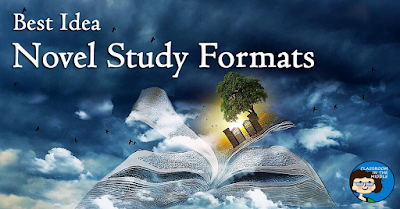After experimenting with various ideas of what to focus on
with my novel studies (There are so many possibilities!), I finally decided to
concentrate on a few key elements:
common core skills, using text based evidence, and higher level
thinking/reading skills. Now I have a
format that I really like, and in fact I think that my novel studies were one
of my best ideas this past year!
Two of the elements
that I include – using text based evidence and using higher level thinking/reading
skills – can be difficult to write questions for on the quick, and I thought that
good novel studies with plenty of these types of questions would be the most
useful for busy teachers. And from
comments that I’ve received, it seems that other teachers think so too – always
great to hear!
Here is how I combined these elements for each set of
chapter questions:
Key Ideas and Details
Getting key ideas and details correct is at the top of the
list in several grades’ reading/literature standards, so I wanted to be sure to
include questions and activities about those elements. With novels, that means making sure that
students get the story elements correct, and straight from the text. Characterization, setting, plot elements,
themes – students need to be clear about these before they can go on to more
complex, inferential questions. And when
they can back up their answers with details from the text, they know they’re
getting them right.
Context Clues
Context clues are another great place to start kid looking
for text based evidence. Whether they
are working on practice exercises or vocabulary from a novel, as kids learn to
look for and use more types of context clues, they get more out of what they
read. Kids can go back to the text of a
novel to define important story vocabulary, to choose among multiple meanings
of a word, to decide why an author chose a particular word to describe a
character, or to complete a cloze exercise such as a chapter summary.
Inferences
Making inferences is the biggie, the complex reading skill
that kids can improve on throughout their years in school. It’s the basis for coming up with really good
responses for many comprehension activities such as predicting, answering the
harder chapter questions, determining character traits, stating themes,
summarizing, and evaluating. Requiring
kids to provide text based evidence for their inferences gets them in the habit
of using evidence for all of their inferences later on even when they may not
always have to spell out the evidence.
In my novel studies, I now include all three of these
sections – Key Ideas and Details, Context Clues, and Inferences – in every set
of chapter questions. These types of
questions keep kids thinking and referring back to the text, and hopefully they
make these novel studies a good resource for their teachers.
In addition, I also include separate activities in each of
these three areas, for use after reading the novel or whenever a more
comprehensive review seems appropriate.
Sides
I now also make two “side items” every time a do a new novel
study. These are two smaller resources
that I list separately in my store. One
is usually an I Have . . .Who Has . . ? game.
These little whole-class activities make a nice quick review of the
“facts” before testing or other final activities for the novel.
The second thing I like to make separately is a little
freebie, something that just seems to go with the specific novel. For example, for the football-themed novel
CRASH, my freebie is a yearbook activity.
For the novel SCHOOLED, it’s an activity about metaphors in the
novel. You can find the freebies for
each of my novel studies in the novel
study section of my Teachers pay Teachers Store.
So what’s next? Next
year I’ll probably try out a few new types of resources, and for sure I want to
do more novel studies. Now I just have
to decide which novel to work on next.
Any suggestions?
Pin to save:





